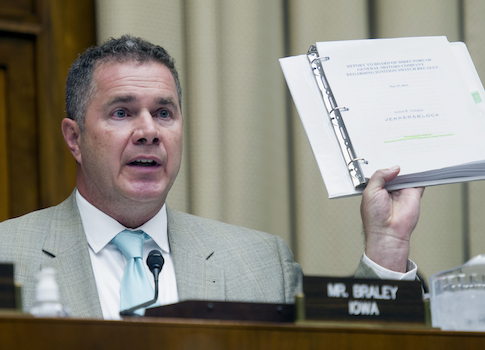Democratic Senate candidate Rep. Bruce Braley (D., Iowa) was one of several Democratic lawmakers who urged the IRS to investigate tax-exempt conservative groups, tying him to a scandal that continues to embroil the Obama administration.
Braley, a four-term Iowa congressman, joined several other Democratic lawmakers in requesting that the IRS investigate whether "any groups qualifying as social welfare organizations under section 501(c)(4) of the federal tax code are improperly engaged in political campaign activity," according to a letter the agency received in April 2012. The letter was one of several documents obtained by the House Oversight Committee.
The IRS inspector general found in a May 2013 report that the agency improperly targeted dozens of conservative groups whose names included words such as "Tea Party," resulting in substantial delays in their applications for tax-exempt status and the requesting by the IRS of unnecessary information. The IRS then told Congress last week that it could not locate thousands of emails from the account of Lois Lerner—the embattled head of the agency’s tax-exempt division who has since resigned—because her computer crashed in the summer of 2011.
Rep. Dave Camp (R., Mich.), chairman of the House Ways and Means Committee, which is investigating the IRS over the targeting scandal, said the missing emails are mainly correspondences to and from people outside the IRS. "The White House, Treasury, Department of Justice, [Federal Election Commission], or Democrat offices," were among the agencies whose correspondence has been lost.
The National Republican Senatorial Committee (NRSC) said on Tuesday that the IRS has "repeatedly stonewalled" its Freedom of Information Act (FOIA) request for all correspondence from the beginning of 2009 until May 2013 between top IRS officials and 13 Democratic lawmakers—including Braley and Rep. Gary Peters (D., Mich.), another Senate candidate.
"Bruce Braley hasn't said a word about the missing emails and actually seemed to encourage the IRS to target citizens and non-profit groups based on their ideological beliefs," said NRSC press secretary Brook Hougesen in a press release. "This is just another instance of Bruce Braley putting his own political career above the well-being of Iowans."
Additionally, Braley has received $7,000 total in campaign contributions since 2006 from the National Treasury Employees Union PAC—the union that represents the IRS. The PAC donated almost $550,000, or 94 percent of its total contributions, to Democrats in the 2012 election cycle, according to the Center for Responsive Politics.
The Iowa Senate race has emerged as one of the tightest contests in the country. Republicans seek a net gain of six seats in the fall to obtain a majority in the chamber.
A Quinnipiac University poll released Wednesday showed Braley with a 44 percent to 40 percent edge over GOP candidate Joni Ernst, within the poll’s margin of error. Ernst is a state senator, Iraq War veteran, and current lieutenant colonel in the Iowa Army National Guard.
Quinnipiac Poll assistant director Peter Brown noted that a third of Iowa voters in the survey do not yet have an opinion on the race. The poll also yielded some surprising results.
"One interesting data point is that voters think 44-31 percent that Ernst cares about their needs and problems, a category in which Republicans, even victorious ones, often struggle," Brown said. "Her TV ads which stressed her farm family background apparently are doing their job."
Braley’s poll numbers have suffered from a string of embarrassing statements about Iowa farmers, including his comments at a January fundraiser where he called Sen. Chuck Grassley (R., Iowa) a "farmer from Iowa who never went to law school."
Braley’s campaign did not respond to a request for comment.
